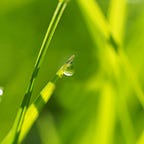Progressive Perspectives on Addiction Recovery
Originally Published 3/28/2020
After severe issues with drug abuse and bipolar disorder I began my journey to recovery when I was 22 and for the first four years I avoided anything that I thought may have a psychotropic effect on my brain.
I recall my initial weeks of “drying out.” They were rough. Like many people making a new commitment to recovery I found myself in AA and NA meetings because those settings are commonly thought of as a key component of overcoming addiction.
I also recall the traditionalist approach that these types of groups advocate feeling archaic and often even judgmental. Personally, the tone and content of the established belief systems these types of groups endorse made me uncomfortable and after a couple of months I abandoned such meetings altogether.
Instead of trying to shoehorn my own recovery goals into traditionalist approaches I opted to work with a team of mental health professionals as I continued to put my issues with drug abuse behind me.
Eventually I was at the stage in my recovery where I needed to define what “recovery” meant to me and develop a comprehensive approach to continuing to avoid alcohol and other dangerous narcotics without allowing symptoms of my other mental health issues to destroy my wellbeing.
Around age 26 I had reached a crossroads: Complications related to bipolar disorder periodically arose and potentiated symptoms of mental illness that had been key factors leading to my original struggles with drug abuse.
I wanted to lead a functional life — physically and mentally. After consulting with my doctors I began using a low dose of cannabis oil in the evenings. At first I was wary, concerned about relapse and the notion that I was betraying myself.
But marijuana became a key component of my recovery and sustained commitment to physical and mental wellbeing. A building block to help me continue on my journey. This is not to say that it can be used carelessly, like any medication it comes with side effects and can even be harmful when misused.
Subsequently I incorporated responsible cannabis use with the rest of my mental health “toolbox.” I did not stop seeing my psychiatrist or therapists after beginning to use marijuana. I didn’t stop exercising, sleeping, or eating properly (all of which are key to anyone’s health!). Recovery is a complicated process and integrating cannabis into my wider treatment system proved to be an effective harm reduction and therapeutic tool.
My stance on this issue is controversial to some but I hope that others in recovery will not avoid potentially valuable options because traditionalist viewpoints abscond them.
Exploring all treatment and recovery methods in a responsible manner is paramount — be it a medication that is prescribed to you, a physical activity that you engage in, a special diet plan, or otherwise.
Our journeys in recovery create dialogues that we can share with one another. Let’s continue to keep open minds and find new, progressive ways to live our best lives and keep the conversations going.
***
Hunter Keegan is an author, musician, and visual artist based in the greater Washington, DC area. His new book about bipolar disorder, “My Brain Is Trying To Kill Me.” was recently published! His full works can be found at hhkeegan.com
